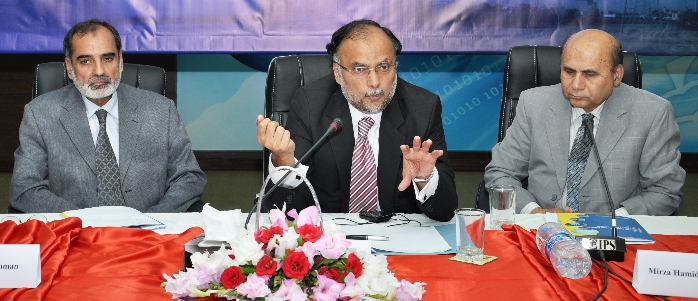
Islamabad, 19 September: Ahsan Iqbal, federal minister for planning and development, has said that the present government was aiming at unbundling the Diamer-Basha dam project into two separate projects: the dam for water storage, which will cost around US$5.5bn; and the electricity generation plant for which private investment will be sought.
“We need to unbundle Diamer-Basha dam project. The dam and electricity generation combined will cost US$12bn but if only the dam is made, it will cost US$5.5bn only. The electricity generation part will be carried out through private investment,” he told the participants of the concluding session of an energy conference organized by Institute of Policy Studies and themed “Toward an Energy Secure Pakistan: Road to Recovery & Sustainability – Agenda for Action”.
He said that construction of Diamer-Basha dam is critical for the country as it was the only dam site on which national consensus exists and it was the only solution for the looming water crisis that could be worse than the energy crisis in the years to come. He said it was criminal on part of the previous regime to ignore this crucial project and waste five precious years out of the nine years that were required to built this dam.
He said an integrated approach was needed to improve energy governance of the country.
“In 1998, we had a plan to add 2800MW in the national grid by 2010 and we were working towards it but the 1999 coup obstructed that planning. The country was run on ad-hoc basis in the last 14 years and it is our biggest challenge to fix the wrongs committed during that period”, he stated.
He underlined that energy conservation needs to be promoted and also deplored that 23-24 per cent line losses due to corruption and mismanagement in Pakistan were the highest in the world, which needs to be checked.
The government cannot provide subsidies endlessly if the cost of generation remains increasing hence the tariff needs to be raised. However, all efforts must be made to reduce the power generation cost, he said further.
“Drastic reforms needed to revamp the system of governance. The first two years of the present government will be tough however I am sure that these testing times will bear fruit and the nation will reap the benefits of good governance and economic reforms”, he claimed.
He was of the view that the Planning Commission had become a PC-1 approval agency in the previous regimes and no intellectual work was being done to take the country towards the path of progress. A delivery unit was now being developed at the Planning Commission where KPIs will be developed for all sectors and the concerned departments will be asked to send their reports based on those KPIs, he informed.
He also stressed for collaborative planning in participation with all think tanks and research organizations by the Planning Commission to make unified efforts to devise a strategic direction for the country for 2025 at least.
DG-IPS Khalid Rahman, in his speech earlier, said that during 2008 to 2013 the then opposition parties that now sit in the government were very vocal on energy crisis and had contested the elections with the promises – among others – of providing the people speedy and sustainable relief in this extremely important arena. Accordingly, one finds in the election manifesto of the PML-N promises to undertake initiatives such as establishment of a ministry of energy & natural resources by integrating ministries of petroleum & natural resources and water & power.
The full-day conference was addressed, among others, by Mirza Hamid Hassan, chairman IPS Tawanai Program and former secretary water & power; Dr Gulfraz Ahmad, former secretary for petroleum & natural resources; Khalid Rahman, DG-IPS; Dr Joseph Wilson, chairman, Competition Commission of Pakistan; Arif Allauddin, managing director, ENERCON; Zafar-ul-Hassan Almas, chief macroeconomics, Planning Commission; Usman Amin-Ud-Din, former minister for petroleum & natural resources; Salahuddin Rifai, senior energy consultant, Salman Azad, director, Punjab Power Development Board, and Dr Saeed Jadoon, head of reservoir engineering, OGDCL and was attended by a number of experts and officials of the concerned ministries and organizations.
The speakers and discussants urged that a single ministry for energy was the need of the hour and were unanimous in underlying the need for a single energy ministry to tackle the crisis. They deplored that there was no effective body or mechanism for energy administration at the national level; the roles were divided in three water tight ministries of petroleum & natural resources, water & power, and planning and there was no overarching institutionalized arrangement for coordination and optimization of synergies and efficiencies. They viewed that effective coordination was not possible through committees as no cabinet member can bear on the roles of another as defined in the Rules of Business.
Mismanagement, corruption, nepotism, duplication of roles, lack of total merit and transparency in planning the energy projects were declared root causes of prevalent energy crisis; a high level national resolve and commitment was urged to resolve it.








